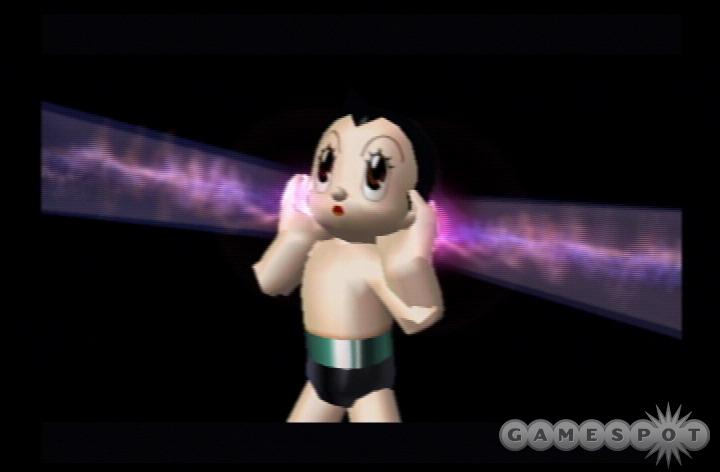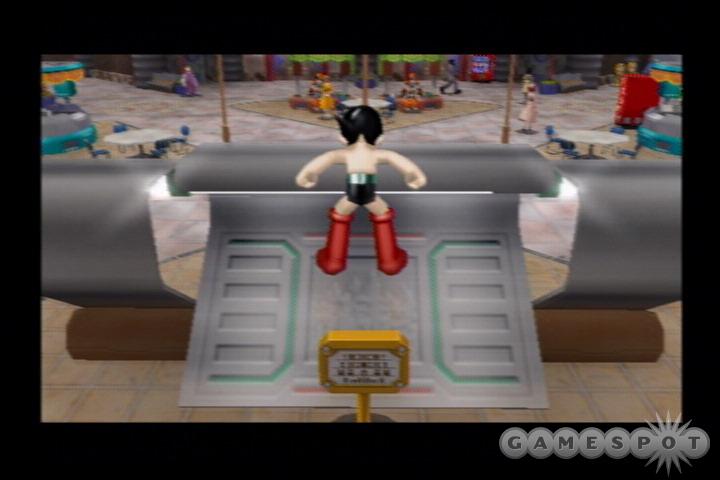For a while there back in July, August was shaping up to be an incredible month for games based on the Japanese manga and anime classic, Astro Boy. Two different titles by two legendary developers were to be released within days of each other. The first, Treasure's Astro Boy: Omega Factor, turned out to be one of the best Game Boy Advance games to date and a legitimate contender for GBA game of the year. Like a one million-horsepower sucker punch to the good feelings we've all suddenly developed toward Astro Boy games, however, the second release, Sonic Team's Astro Boy: No Subtitle, turns out to pretty much stink.

Astro Boy is a robot child designed by Dr. Tenma, a brilliant engineer who builds Astro to replace his own dead son. Though you might expect the result to be a Monkey's Paw-style cautionary tale in which the robotic surrogate becomes a monster, Astro sort of surprisingly ends up being better than the original kid. Not only is he "brave, gentle, and wise," but he also has rocket feet and a cannon built into his arm. Wearing nothing but big red boots and a tight-fitting pair of black underpants, he flies around a futuristic megalopolis called Metro City fighting injustice and generally trying to convince everyone that humans and robots can live together in peace.
Sonic Team's Astro Boy recounts the robot's origin and early battles in the form of a third-person action game. Though it should be noted that "action" is being employed here to describe the genre and does not indicate anything you're likely to experience in the game itself. Traditionally, a game of this style is split into levels through which you battle a swarm of minions on your way to a boss encounter. You probably know this already. It may have been the design team's first day on the job, however, because, incredibly, this simple but effective blueprint is ignored.
The game consists of nine battles against eight bosses in six different environments. The first five bosses have virtually no preamble other than flying around the city (through several load points) to exchange a line or two of dialogue with whichever character unlocks the next section. The last few battles make an attempt to preface the boss with a proper level, though it's halfhearted at best. For instance, during one mission that takes place inside a volcano, you must fly through a maze constructed of the same three or four ugly rooms repeated over and over again. Another late mission uses the same tactic, but replaces the volcano motif with an equally unimpressive warehouse theme.
This super-economy design approach could have been mitigated by impressive boss battles. In fact, the first boss--a robot spider attacking a bridge--is sort of neat. Unfortunately, it's all downhill from there. Most of the boss designs are dull, both visually and in terms of gameplay. The fights are generally easy, straightforward affairs during which you dodge for a few seconds and then attack. Astro has seven abilities that get unlocked as the game progresses, but for the most part a flying spin attack can be used exclusively against the majority of the bosses. Absolutely none of the gonzo creativity displayed in Treasure's Astro Boy title is evident here. Though one boss that rides a horse around the endless vacuum of space while screaming "Giddyup!" every few seconds is pretty funny.
The ease of the boss battles combined with the lack of doing anything other than battling bosses results in a short game. Expect to reach the end in less than five hours--and that's allowing for some lost-in-the-volcano-maze time. In an attempt to increase the game's length, there's a series of 85 collector cards scattered around the city. Some of them are hidden inside breakable objects, some are rewards for flying through ring courses, and some are doled out based on oddball activities like trivia quizzes and Simonlike pattern-matching games. Unfortunately, nothing about the core gameplay is satisfying enough to make the exploration needed to uncover these cards appealing in any way. The flight mechanism works, but sluggish camera controls and a total absence of any feeling of speed mean you won't be motivated to tool around Metro City for the simple thrill of it. Grand Theft Auto this isn't.

Visually, Astro Boy is fine. The simple geometry and primary colors give the whole thing a nice, cartoonlike look. There's also a subtle but cool depth-of-field effect that blurs objects in the distance. The characters are all voiced by actors from the recent Astro Boy cartoon series, which grants the silly dialogue more personality than it would otherwise have.
The problem with trashing a game based on a cartoon for kids is that it's entirely possible that the whole thing is meant for 7-year-olds who haven't been playing games long enough to know a good one. On top of that, obsessive fans of the series will find plenty of references to obscure characters from the Astro Boy universe. Still, it would have been a more valuable homage to the life's work of Osamu Tezuka had Sonic Team simply created a better game.